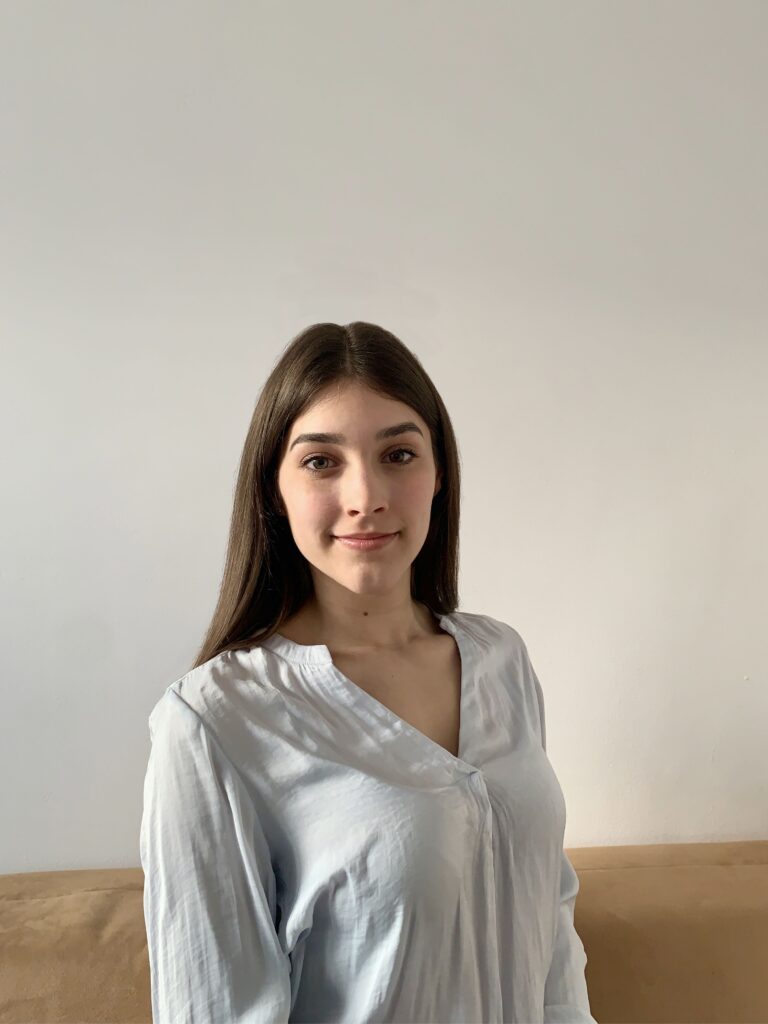Daniela Frühauf, a graduate of the Master’s program in Executive Management, wrote her Master’s thesis on the subject of collaborations for the social good at the Institute for Business Ethics and Sustainable Strategy (IBES) under the supervision of Maria Riegler. Determination, passion and perseverance were essential for her in the process of writing the thesis. IBES spoke to Daniela Frühauf, who works as a recruiter, about the path of writing a master’s thesis.
Daniela Frühauf has completed her Master’s degree in Executive Management in 2022 at FHWien der WKW.
What is your Master’s thesis about?
In my Master’s thesis, “Why do Austrian firms collaborate for the social good? The interplay of costs and benefits for Austrian enterprises and society when contemplating collaborations”, I am investigating the role of economic and social benefits for companies which join collaborations. It is about whether companies are even aware that collaborations cannot only bring economic benefits but also contribute to more sustainability, not solely for the company but on a social level. This led to my research question: What role do economic and social advantages play for companies when they consider collaborations?
How was the whole process for you, from finding a topic to getting started?
The topic was advertised on the IBES homepage, and it appealed to me immediately because I also dealt with collaborations in my Bachelor’s thesis. At that time, without any connection to the topic of sustainability. The issues were presented in the “Business Ethics and Sustainability” course in the second semester. The subject of collaboration appealed to me; I found the topic exciting because I have not previously associated cooperations with sustainability. I applied for this with a proposal. It all happened pretty quickly.
And what was your motivation behind the topic?
I found it exciting because my Master’s degree in Executive Management has a purely financial background, but this topic illuminates the sustainability aspect. The topic shows a perspective you do not necessarily see at first glance, mainly that collaboration can be multifaceted. I would find it exciting if something in this direction would be considered. In my private life, sustainability is essential, which is why I felt very connected to the topic.
Which qualities were essential for you in the process of the Master’s thesis?
You must be determined, connect to the topic, and not be put off. Yes, it is a big chunk because the work takes a lot of time, but do not lose sight of the goal. It is much easier with an exciting topic.
How did the process of the Master’s thesis start? What challenges have you encountered?
In principle, I found the literature review actually very easy. I have an Excel sheet with all my literature, with keywords, and I have written down where in my work the respective text could fit. That made it a lot easier for me, and I can only recommend it to everyone. Quantitative research was a bit more difficult for me. It was the first time I did it on my own: creating a survey based on my hypotheses.
I sent out the survey in the summer, right around the holiday season, so I had to wait longer for answers. But I am very grateful to my supervisor Maria Riegler for always supporting me, especially with the quantitative part. I wouldn’t have been able to do it so well on my own. The quantitative research methods course was also beneficial. The most challenging thing for me was setting up the variables since they had to be coordinated with the survey and the hypotheses.
How did you experience the Master’s thesis supervision?
Incredibly significant, I have to say. I appreciated it: as soon as I wrote an e-mail, I received a reply within a very short time. That was great because I know it is not always like that. Often I was not sure if I was asking too many times. The feedback that I was on the right track was precious. My supervisor, Maria Riegler, gave me incredible support, and I could rely on the fact that I would get help, which is very good to know.
What impact could your Master’s thesis have?
The work shows that the potential of sustainability and collaboration is unmated, and I think it is a shame that companies are unaware that they can achieve more by collaborating. I do not know if companies are unaware of this or do not want to admit it, but I know they should consider it. I think that companies still need a lot of clarification here in terms of implementation.
What would you recommend to researchers or companies in this context?
In any case, the topic still has a lot of much for further research. For example: Why is this potential of collaborations not realized? How to improve perception?
Companies should see collaborations as an option and look at them from different perspectives – not just the financial perspective. There is a lot of potential in collaboration, e.g. for training programs.
